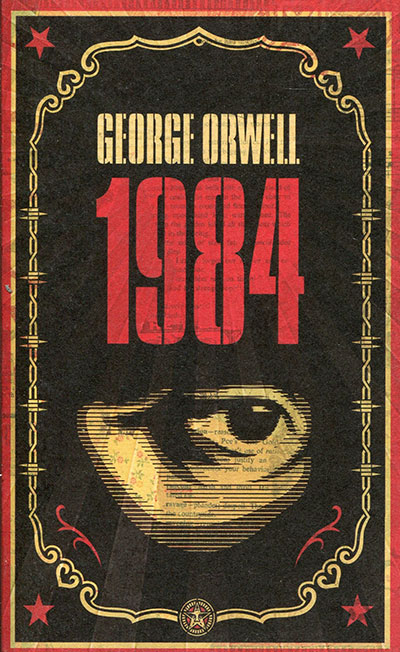1984 by George Orwell was far more frightening than I remembered it to be. It has been over a decade since I’ve last read it, and much of the themes and character decisions didn’t fully realize in me at the time. Now, not only do I see the significance of this cautionary tale, but I see it as a testament of its era. George Orwell knew all too well, the methodological steps to erode humanity; the systematic oppression and destruction of peoples, history, and the world itself. During the 1940s and the rise of totalitarianism, Orwell (real name Eric Arthur Blair) saw that the world was drowning in lies. To explore the dangers of mass ignorance as well as power through pure fanaticism, he wrote this novel.
The main character in this story is Winston Smith, with a secondary in Julia. Winston and Julia are both broken in a lot of ways, due to their miserable lives as lower party members. Winston is a lonely, drunk, nearly crippled by a varicose ulcer. He wanders through life, almost aimlessly, diligently completing his tedious party duties, only to dream of prole uprisings and party insurrections or inner conspiracies. Winston is drawn to two figures he sees from time to time.

The first is Julia, a lovely young woman who dons the sash of the junior anti-sex league of abstinence. Winston resents her, drawing up violent thoughts toward her, even as she passes him sly, longing looks. The paranoia in this society, caused by the oppression of Big Brother is prevalent in all the party members. He begins to suspect she may be an agent of the thought police, challenging him to reveal a thought crime through his face. Controlling facial expressions under the party is now a new instinct, a necessary tactic of survival. Their interactions eventually lead to an affair with its humble beginnings as a simple act of rebellion. As they both bond closer over their hatred of the party, the affair soon evolves into passion and love. Julia’s ambitions are limited to a life full of resistance and sex, a secret ploy to prove even the most loyal of men are adulterous hypocrites; to prove the impiety of Big Brother.
Winston has little aims other than to stay under the radar of the party, but dwells deep in the importance of the past. Convinced to the bone, that there is objective truth, despite the party’s insistent evidence to the contrary. Winston’s aims seem to grow as Julia lets on that she has slept with hundreds of party members, convincing Winston that there are a lot of cracks in the system, and that there is plenty of active resistance, even if for petty means. This leads them to meet the second individual whom Winston is inexplicably drawn to.
The second person is inner party member O’Brien, an intelligent and strong man who leads Winston to believe that he is in a similar perspective of resentment toward the party and modern society, only to reveal himself as a fanatic leader in the Ministry of Love. Winston and Julia pledge their allegiance to an underground movement, in which O’Brien has directed them to. O’Brien shares a book with Winston called The Theory and Practice of Oligarchical Collectivism. In this text details the true nature of the party in terms of its goals, practices, and underlying reasons.
This book, claimed to be written by one of Big Brother’s greatest subversives, turns out to be written by the party itself. The book, said to contain forbidden propaganda, is in actuality an educational guide on the party and its fanatic principles of obtaining and maintaining power against the historical pattern in the rearranging of human hierarchies. O’Brien, absolute in his beliefs, is hellbent in not only eradicating and forcing confessions of perceived party traitors, but making sure they are first ‘cured’ of their ‘insanity’, and that they are rendered genuinely convinced of Big Brother’s preachings. He wholeheartedly believes one must be broken down and stripped of humanity in order to enter into the loving, all encompassing, immortal embrace of Big Brother. Winston and Julia are tortured, starved, and psychologically strained until their once enduring love is whittled down to mere indifference toward one another. The last scene in the book, after his capture, interrogation, torture, and rehabilitation, is Winston eerily coming to the realization that he now loves the black-mustachioed face of Big Brother.
In a time where historical knowledge in its entirety is accessible to nearly everyone, and as citizens of the future, we have a duty to understand our past. Even the various fictions that were layered with realities, deliver us a look into past minds and worlds. 1984 essentially warns us of two things, while relaying a bit of hope. The first is in the dangers, as well as the subtleties, of overreaching totalitarian regimes. How the path to pure power leads to fanaticism, and then the degradation of the human spirit, in both the subjects as well as the enforcers. The second is the limit of one’s humanity; the fragility of one’s love, passion, and sense of liberty against true evil; against torturous horrors. The bit of hope the story leaves, although it is only a small hope as opposed to a promise of a better tomorrow, is in the proles.
The average man and woman, who toil away despite their harsh existences, build families, share love with one another, and sing. Only in their hearts and blood, is the power to overthrow the party. Only in the endurance of family, genuine purposeful labor, love and pain, will they carry on the human tradition, while the party may collapse under its regimented weight.

